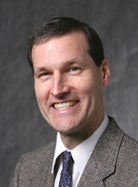
-
JEC 2026
- haleyt2@rpi.edu
-
518-276-6975
About
Technical strengths:
- Nuclear criticality safety analysis
- Monte Carlo and deterministic simulations of systems, experiments, and tests
- Mathematical and statistical modeling and software development
- Analysis of nuclear power generation, operation, and control
- Developing and implementing quality assurance methodologies and procedures
- Teaching award-winning blended/hybrid university courses
Prior to returning to Rensselaer, Thomas Haley was a nuclear engineer for sixteen years with Northeast Technology Corporation. Major projects involved criticality safety analysis, material and neutronic characterization of neutron absorbers, radiation transport and energy deposition, spent fuel storage design, spent fuel pool chemical kinetics, qualifying and evaluating in-situ non-destructive neutron absorber diagnostics, core refueling design, fuel thermal-mechanical analysis, thermal hydraulics, statistical and numerical analysis, and software development.
Ph.D., Nuclear Science and Engineering, Rensselaer Polytechnic Institute, 2000
∙ concentrations in criticality safety, Monte Carlo methods, verification and validation
∙ thesis: Improved Analysis of Bias in Monte Carlo Criticality Safety. (Advisor: Don Harris)
M.S., Applied Mathematics, Rensselaer; 1992
∙ concentrations in modeling and numerical analysis: mechanical vibrations, chemical carcinogenesis, resurrecting novel numerical method for solving ODEs
∙ IBM Research Assistant mathematically modeling and analyzing mechanical vibrations in a high speed impact printer
∙ thesis: The role of mathematical modeling in toxicology: a review in the context of chemical carcinogen regulation design. (Advisor: Don Drew)
M.S., Environmental and Energy Engineering, Rensselaer; 1990
∙ concentration in energy policy and economics
∙ Institute of Nuclear Power Operations Fellowship
∙ Department of Energy Research Assistant: assessing models of two-phase flow
∙ thesis: A characteristic analysis of mathematical models of two-phase flow in one space dimension. (Co-Advisors: Dick Lahey and Don Drew)
B.S., Nuclear Engineering, Rensselaer; 1984
∙ minors in Mathematics and Philosophy
∙ independent studies:
– An analytical analysis of BWR stability
– Engineering problems of lithium breeding in tokamak fusion reactor blankets
∙ overloaded social science, humanities, seminar, and survey courses in various fields
∙ awarded Erwin R. Gaertner prize for “Outstanding Potential in Graduate Studies”
∙ senior project: Nuclear Fuel Temperature Profiles. (Advisor: Mike Podowski)
Research
Engineering for 2040: developing and implementing curriculum initiatives and corresponding courses that prepare Rensselaer students to be leaders and learners for decades to come.
Teaching
List of Eighteen Courses Taught at Rensselaer (Troy campus, as well as the “Malta Program” for full-time active duty Navy enlisted personnel pursuing a Rensselaer Nuclear Engineering degree)
ENGR-1100 Introduction to Engineering Analysis (Troy, Malta)
ENGR-2020 Design, Innovation, and Society Studio 3 (Troy – joint with STS/HASS)
ENGR-2050 Introduction to Engineering Design (Troy)
ENGR-2250 Thermal and Fluids Engineering I (Troy, Malta)
MANE-1960 Introduction to Engineering Computation (Troy)
MANE-2110 Numerical Methods and Programming for Engineers (Troy)
MANE-2830 Nuclear Phenomena for Engineering Applications (Troy, Malta)
MANE-4020 Thermal and Fluids Engineering Lab (Troy)
MANE-4350 Nuclear Instrumentation & Measurement (Troy)
MANE-4450 Nuclear Fuel Management (Troy)
MANE-4470 Radiological Engineering (Troy)
MANE-4480 Physics of Nuclear Reactors (Malta)
MANE-4960 Nuclear Criticality Safety (Troy, Malta)
MANE-4960 Monte Carlo for Engineers (Troy)
MANE-6290 Radiation Transport Methods (Troy)
MANE-6300 Numerical Methods in Reactor Analysis (Troy)
MANE-6350 Radiation Shielding (Troy)
MANE-6810 Mathematical Applications in Nuclear Engineering & Engineering Physics (Troy)
I approach my teaching at Rensselaer with the following vision.
To be a leader with global reach and global impact, Rensselaer engineering students must learn to collaborate with multiple disciplines, practice multiple ways of thinking, and solve problems in multiple time scales:
multiple disciplines
∙ mechanical, aeronautical, nuclear, biomedical, chemical, civil, computer, electrical, environmental, industrial, management, materials, systems,....
∙ engineering sciences, fundamental sciences, social sciences, management sciences, building sciences,....
∙ sciences, humanities, business, law,....
multiple ways of thinking
∙ modeling: geometric, mathematical, functional, operational, numerical, heuristic, proof-of-concept,....
∙ decision making: risks versus rewards, benefits versus consequences, critical choices, quantitative and qualitative....
∙ communication, learning, and teaching, in all their forms....
∙ theory and application, modeling and analysis, design and manufacture, development and diagnostics, systems/components/interfaces,....
multiple time scales – adapting to and designing for the rates of change in
∙ technology and innovation
∙ society, industry, and education
∙ cultures, economies, and institutions
∙ environment and resources
Even when teaching students outside of engineering – Science and Technology Studies, Sustainability Studies, Computer Science, Biology, Chemistry, Management, and Architecture, to name some that have been in my classes – I teach them as a student at a Polytechnic Institute given that they chose to embrace that perspective from the course I am teaching.
Thus, I do not teach a course in isolation, but as part of the continuum of their life-long learning process. I draw on what skills they bring to class from previous courses, and I prepare them to better engage with subsequent courses and subsequent employment, no matter what direction they choose to go.
Nuclear Engineering Senior Design Project I & II
Recognition
David M. Darrin Counseling Award, 2017
∙ for unusual contribution in the counseling of undergraduate students at Rensselaer Polytechnic Institute; selected by Phalanx student leadership honorary society
Greenhouse Exemplary Course Program Award, 2007
∙ best in world (according to WebCT / Blackboard), blended/hybrid course Nuclear Phenomena for Engineering Applications (with M-P. Huguet, course developer, and D. Steiner, content expert)
Publications
The following is a selection of recent publications in Scopus. Tom Haley has 4 indexed publications in the subjects of Medicine, Environmental Science, Medicine.